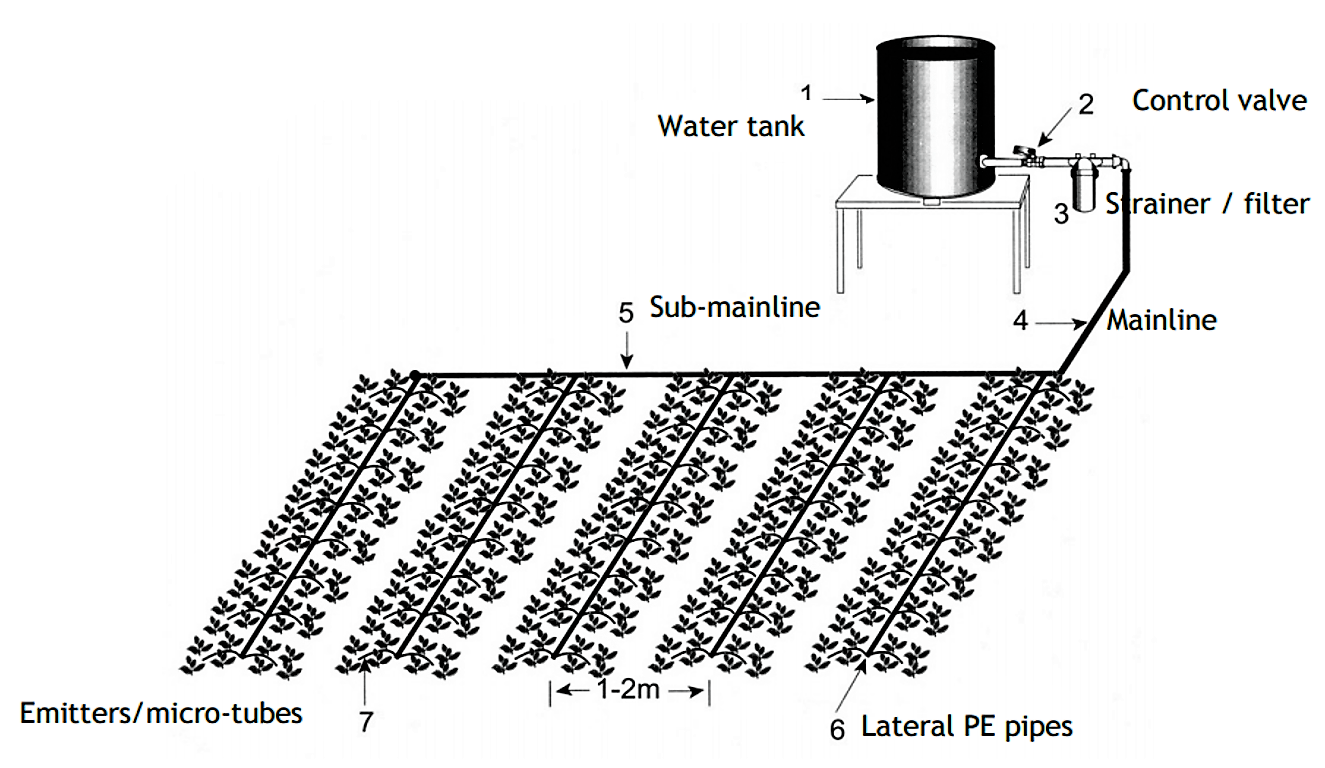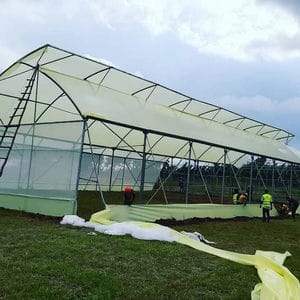What Is Drip Irrigation in Kenya?
Drip irrigation in Kenya is a precision farming method that delivers water directly to plant roots via a controlled network of pipes and emitters.
Ideal for arid and semi-arid regions, drip systems reduce water wastage by up to 60% and boost yields. This article explains drip kit prices, components, diagrams, and where to buy systems tailored for Kenyan farms, including one-acre kits.
Drip irrigation in Kenya is a water-efficient farming technique where water drips slowly to the roots of plants through a network of valves, pipes, tubing, and emitters. It is widely adopted by Kenyan farmers due to its ability to conserve water, increase crop yield, and reduce labour costs. Whether you’re growing tomatoes, capsicum, onions, or fruits, this system is revolutionizing how agriculture is done, especially in water-scarce counties.
What is Drip Irrigation?
Drip irrigation is an agricultural method that applies water directly to the root zone of plants, drop by drop. It eliminates water loss due to evaporation or runoff, making it more efficient than traditional irrigation methods like furrow or basin.
How It Works
-
Water flows through a mainline to sub-mains
-
It is filtered and then flows into drip tapes
-
Emitters release water slowly at low pressure
-
Each plant receives water directly at the root zone
Drip Irrigation in Kenya: Why It’s a Game-Changer
Kenya faces irregular rainfall patterns, prolonged droughts, and high water costs. Drip irrigation in Kenya has emerged as a smart solution for farmers looking to:
-
Conserve water (up to 60% savings)
-
Grow high-value crops like tomatoes, capsicum, and strawberries
-
Harvest consistently, even in dry seasons
-
Reduce fertilizer use with fertigation systems
Key Components of a Drip System
| Component | Description |
|---|---|
| Drip Lines | Pipes with emitters that release water along the row |
| Filter | Prevents clogging by removing particles from water |
| Take-Offs | Connect drip lines to the sub-main |
| Rubber Washers | Ensure leak-proof joints |
| Mainline Pipes | Carry water from the tank to the sub-main |
| Connectors | Join different pipes and accessories |
| Control Valves | Regulate pressure and allow sectional watering |
| Tank (500–3000L) | Stores and supplies gravity-fed water |
Drip Irrigation System Price in Kenya
Drip irrigation system price in Kenya depends on:
-
Farm size
-
Pipe grade (especially drip irrigation grade 4)
-
Type of crop
-
Water source (gravity or pump-fed)
Average Price Guide:
| Farm Size | Gravity-Fed Drip Kit | Pump-Fed Drip Kit |
|---|---|---|
| 1/8 acre | KES 12,000 – 15,000 | KES 15,000 – 18,000 |
| 1/4 acre | KES 25,000 – 30,000 | KES 28,000 – 35,000 |
| 1 acre | KES 65,000 – 85,000 | KES 80,000 – 95,000 |
Prices may vary based on location
1 Acre Drip Irrigation Kit Price in Kenya
A full 1 acre drip irrigation kit price in Kenya from Hortitechno Greenhouses starts from KES 75,000 for gravity-fed systems and can go up to KES 95,000 for pressure systems.
Includes:
-
16mm drip lines (grade 4 UV-treated)
-
500–1000 micron filter
-
Mainline and sub-mains
-
Valves, connectors, take-offs
-
Installation manual and support
This setup can support crops such as tomatoes, onions, capsicum, sukuma wiki, and even fruit orchards like passion and avocado.
Amiran vs Hortitechno Drip Kits
While Amiran drip irrigation kit price ranges from KES 80,000 to 120,000 per acre, Hortitechno provides a customized, affordable, and scalable alternative starting from KES 65,000 per acre.
Why Choose Hortitechno:
-
On-ground support and agronomic guidance
-
Easy-to-install diagrams and fittings
-
High-quality, long-lasting grade 4 drip pipes
-
Competitive pricing
Drip Irrigation Diagram for Kenyan Farms
Below is a simplified drip irrigation diagram used in most Kenyan farms:
[Water Tank]
|
[Mainline Pipe]
|
[Filter] – [Control Valve]
|
[Sub-main Line]——[Drip Lines → Emitters]
This layout ensures even pressure and uniform distribution to all plant rows. Hortitechno provides layout design upon purchase.
Advantages and Disadvantages
Drip Irrigation Advantages:
-
Saves water and energy
Promote uniformity in growth
-
Reduces weed growth
-
Promotes plant health through consistent watering
-
Compatible with fertigation systems
-
Works in sloped, dry, or rocky terrains
Disadvantages:
-
Higher initial setup cost
-
Emitters can clog without proper filtration
-
Regular maintenance is required
Overall, the pros outweigh the cons—especially with technical support from Hortitechno Greenhouses.
Sprinkler Irrigation vs Drip Irrigation
| Feature | Drip Irrigation | Sprinkler Irrigation |
|---|---|---|
| Water efficiency | Very high | Moderate |
| Best for | Row crops, orchards | Lawns, cereals |
| Maintenance | Medium (needs filters) | High (prone to wind interference) |
| Installation cost | Moderate | Higher |
| Soil erosion risk | Low | High in light soils |
Buying Guide: Tips for Choosing the Right System
Here’s what to consider before buying a drip irrigation kit in Kenya:
-
Farm size: Match drip line spacing and length to your acreage
-
Crop type: Wider spacing for fruit trees, narrower for vegetables
-
Water source: Ensure sufficient pressure or use gravity-fed if remote
-
Quality assurance: Always ask for drip irrigation grade 4 pipes
-
Supplier support: Choose companies offering installation guidance and after-sale support
Tip: Avoid buying from random hardware shops without knowing the material grade or compatibility with Kenyan crops.
FAQs
What is drip irrigation and how does it work?
Drip irrigation is a low-pressure, water-saving system that applies water directly to the roots of plants. It uses emitters connected to pipes to slowly drip water to each plant.
What’s the 1 acre drip irrigation kit price in Kenya?
It ranges between KES 65,000 and 95,000 depending on system design, grade, and supplier.
Is drip better than sprinkler irrigation?
For vegetables and orchards, yes. Drip uses less water, reduces disease, and increases yield compared to sprinklers.
Can I install it myself?
Yes, if provided with a drip irrigation diagram and fittings. Hortitechno offers installation support and video guidance.
What’s drip irrigation grade 4?
It’s a high-quality pipe material, UV-treated and pressure-rated, used in professional farming. Always request this grade from trusted suppliers.
Drip irrigation in Kenya is no longer a luxury—it's a must-have tool for any serious farmer. Whether you’re growing vegetables for Nairobi markets or exporting passion fruits to the Gulf, a well-installed drip system ensures better water use, healthier crops, and higher profits.
Instead of overpaying for commercial kits like the Amiran drip irrigation kit price, you can get custom, affordable, and scalable drip systems from Hortitechno Greenhouses.
Ready to upgrade your farm?
Call or WhatsApp Hortitechno Greenhouses today at +254 723 053 026
Or visit www.kenyagreenhouse.com to view our drip kits, greenhouses, and irrigation solutions tailored for Kenyan farmers.
Benefits of Drip Irrigation in Kenya
Saves Time: Drip irrigation system saves time since it requires minimal labor once it's operational, and the water is controlled from the source.
Saves Water: Drip irrigation system optimally uses little water, making it a preferred method over other conventional irrigation systems, as it uses 30-50% less water.
Saves Labor: Drip irrigation system saves labor since it requires minimal supervision and maintenance.
Improves Plant Growth: Drip irrigation system improves plant growth by delivering water directly to the roots of the plants, ensuring the plants get adequate water and nutrients to grow optimally.
Saves Money: Drip irrigation system is easy to install and maintain, making it cheap to maintain, and farmers can mix pesticides, herbicides, and fertilizers with water at the source and trickle it down to the plants through the system.

Types of Drip Irrigation Systems:
Porous Soaker Hose Systems: These systems deliver water to plants by letting water seep through the hose's pores, ensuring water is evenly distributed to the plants.
Emitter Drip Systems: These systems deliver water through emitters that release water directly to the roots of the plants.
Watermatic Drip System: This system delivers water through a computer-controlled system, ensuring that water is delivered according to the plants' needs.
Micro-Misting Sprinklers: These systems deliver water through misting sprinklers that release small water droplets to the plants, ensuring even water distribution.
Challenges of Drip Irrigation in Kenya:
Availability of Resources: Availability of resources such as machinery and clean water can pose a challenge to drip irrigation, especially in remote areas.
Type of Soil: The type of soil can affect the effectiveness of the drip irrigation system since some soils do not absorb water effectively.
Type of Crop: Different crops have different water needs, making it essential to consider the type of crop grown when implementing drip irrigation.
Expert Assistance: Drip irrigation systems require expert assistance, which increases running and maintenance costs.
Drip irrigation is an effective way of watering plants in Kenya since it saves time, labor, and water. Although the system is cost-effective, it requires careful consideration of various factors such as availability of resources, soil type, crop type, and expert assistance.
The government, private sector, and NGOs should come together to share knowledge, technology, and money resources to improve the sector and increase the adoption of drip irrigation.



.png)





 20%
20%



0 Reviews
Your rating